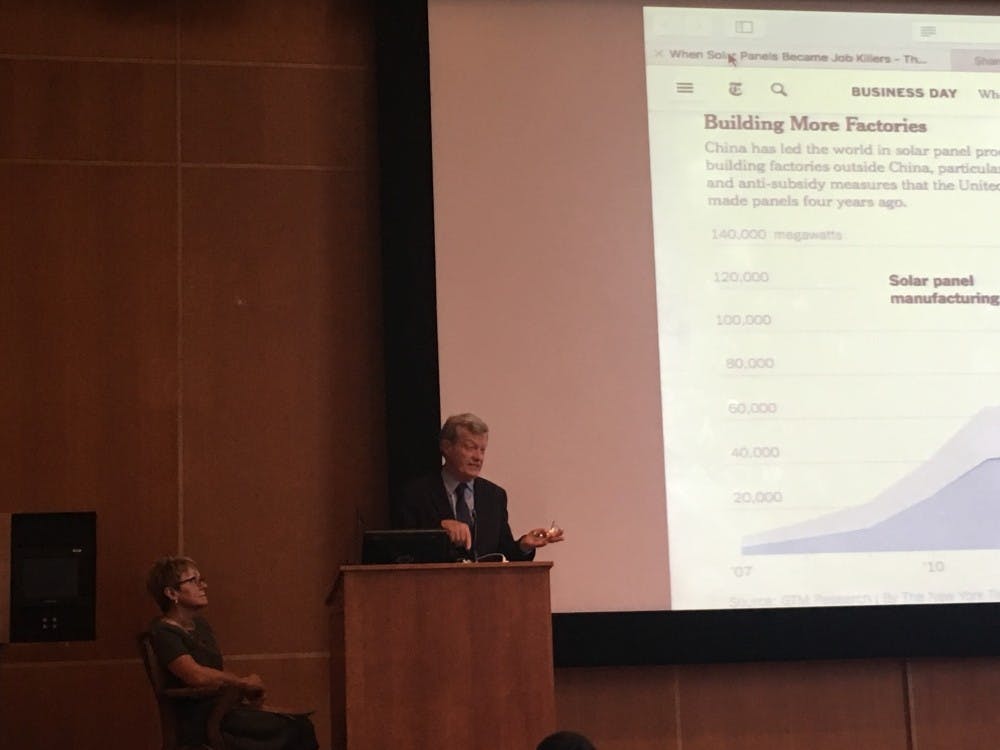When describing relations between the United States and China, former U.S. Ambassador to China Max Baucus said that “it’s kind of like a marriage,” in that each country needs the other in order to pursue their goals in the world.
A crowd of approximately 100 students gathered to hear Baucus speak about his career in public service and his opinions on the future of U.S.-China relations.
“Service is the most noble endeavor,” said Baucus, a former senator from Montana who served as the U.S. Ambassador to China in President Barack Obama's administration.
The event was part of the Princeton U.S.-China Coalition’s “U.S.-China Global Governance Forum,” a five-day conference aimed at increasing dialogue an interest in U.S.-China issues on a grassroots level. In addition to members of PUCC, 30 delegates from various universities in the U.S. and in China came to participate in the forum.
Co-President of PUCC Eric Wang ’18 introduced Baucus as “the man to hear about U.S.-China relations from.”
Before serving as ambassador, Baucus gained extensive experience in international trade, and he previously played a large role in gaining congressional approval for normalizing relations between the two countries.
He began his presentation by talking about his personal motivations for entering public service.
As an undergraduate student at Stanford University, Baucus spent six months in an overseas campus in France and then immediately embarked on a one-year hitchhike around the world.

“It was probably the best year of my life, because it opened my eyes,” he said.
While visiting what was then the Belgian Congo, Baucus said that he had an epiphany that “the world is getting smaller and resources are diminishing.” During this trip, Baucus not only began to grow an appreciation for other cultures, but he also realized that if he can improve his life, “perhaps [he] can make another person’s life a little bit better.”
“Each of us serves in a different way,” Baucus added, reminding students that they can find unique ways of giving back to their communities.
Baucus noted that at times during his service as an ambassador, he felt as if his efforts “went nowhere. For example, according to Baucus, most official summits consist of presidents from both countries reading off of “statements that are so scripted, so formal . . . and neither ask any questions.”

However, Baucus also noted that despite these setbacks, the United States and China have recently accomplished some noteworthy achievements together, such as helping to fight Ebola, building global health facilities, and taking steps to combat climate change.
Baucus further stressed the importance for students, politicians, and diplomats to understand that the U.S. is unique in its upholding of what he deemed Judeo-Christian ethics.
“We tend to forget that other countries aren’t like that,” he said.
When asked about the future of U.S.-China relations, Baucus stated that the U.S. needs to make “mutual accommodation” possible and also needs to develop a long-term plan “with more structure.Baucus also characterized the North Korean threat as an “existential question” that “requires much more creativity” on America’s part.
Michaela Milligan, a student from DePaul University in Chicago, Ill. was one of the 10 delegates attending the forum. An anthropology major who has now been studying Chinese for seven years, Milligan said that she came to the conference “to network, to talk to people, to make friends and see how people studying economics, international relations and political science are thinking about U.S.-China Relations.”
Milligan aims to “help Americans better understand China” and to reduce the “fear and anxiety around China” that she witnessed growing up in her home community.
Alice Yang, a delegate at the forum from Shanghai International Studies University, said that she “thought [the conference] was a very valuable chance to communicate with other students and experts interested in U.S.-China relations.”
The event was held on April 9 at 3 p.m. in McCosh 10 and was the last event of the U.S.-China Global Governance Forum.








